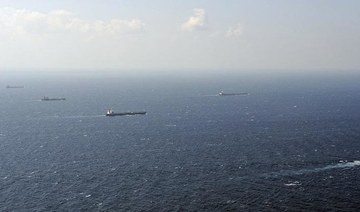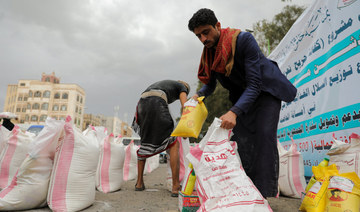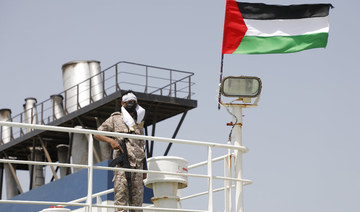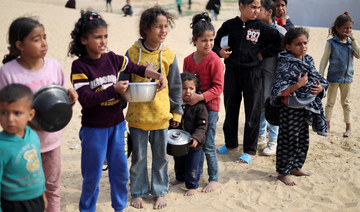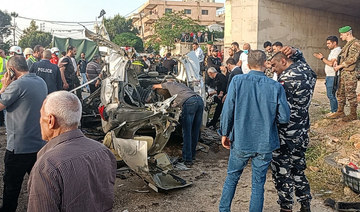DUBAI, UAE: Yemen’s Houthis claim to have a new, hypersonic missile in their arsenal, Russia’s state media reported Thursday, potentially raising the stakes in their attacks on shipping in the Red Sea and surrounding waterways against the backdrop of Israel’s war with Hamas in the Gaza Strip.
The report by the state-run RIA Novosti news agency cited an unidentified official but provided no evidence for the claim. It comes as Moscow maintains an aggressively counter-Western foreign policy amid its grinding war on Ukraine.
However, the Houthis have for weeks hinted about “surprises” they plan for the battles at sea to counter the United States and its allies, which have so far been able to down any missile or bomb-carrying drone that comes near their warships in Mideast waters.
On Thursday, Abdul Malik Al-Houthi, the Houthis’ secretive supreme leader, said the militia will start hitting ships heading toward the Cape of Good Hope in Africa’s southern tip. Until now, the militia has largely struck ships heading into the Red Sea toward the Suez Canal, and such an escalation would target the longer, alternative route used by some vessels. It remains unclear how they would carry any possible assault out.
Meanwhile, Iran and the US reportedly held indirect talks in Oman, the first in months amid their long-simmering tensions over Tehran’s rapidly advancing nuclear program and attacks by its proxies.
Iran, the Houthis’ main benefactor, claims to have a hypersonic missile and has widely armed the militia with the missiles it now uses. Adding a hypersonic missile to their arsenal could pose a more formidable challenge to the air defense systems employed by America and its allies, including Israel.
“The group’s missile forces have successfully tested a missile that is capable of reaching speeds of up to Mach 8 and runs on solid fuel,” a military official close to the Houthis said, according to the RIA report. The Houthis “intend to begin manufacturing it for use during attacks in the Red Sea and the Gulf of Aden, as well as against targets in Israel.”
Mach 8 is eight times the speed of sound.
Hypersonic weapons, which fly at speeds higher than Mach 5, could pose crucial challenges to missile defense systems because of their speed and maneuverability.
Ballistic missiles fly on a trajectory in which anti-missile systems like the US-made Patriot can anticipate their path and intercept them. The more irregular the missile’s flight path, such as a hypersonic missile with the ability to change directions, the more difficult it becomes to intercept.
China is believed to be pursuing the weapons, as is America. Russia claims it has already used them.
In Yemen, Abdul Malik Al-Houthi boasted that his fighters “continue to expand the effectiveness and scope of our operations to areas and locations the enemy never expects.” He said they would prevent ships “connected to the Israeli enemy even crossing the Indian Ocean ... heading toward the Cape of Good Hope.”
The Houthis have attacked ships since November, saying they want to force Israel to end its offensive in Gaza, launched in response to Hamas’ Oct. 7 attack on southern Israel. The ships targeted by the Houthis, however, have increasingly had little or no connection to Israel, the US or other nations involved in the war. The militia has also fired missiles toward Israel, though they have largely fallen short or been intercepted.
The Houthis don’t have a navy, nor weapons reaching into the far distances of the Indian Ocean, making their Cape of Good Hope threat difficult. However, Iran is suspected of targeting Israeli-linked vessels previously in the Indian Ocean. The Houthis have claimed attacks assessed to have been carried out by Iran in the past, such as the 2019 attack on Saudi Arabia that temporarily halved its oil production.
After seizing Yemen’s capital, Sanaa, in 2014, the Houthis ransacked government arsenals, which held Soviet-era Scud missiles and other arms.
As the Saudi-led coalition entered Yemen’s conflict on behalf of its exiled government in 2015, the Houthis’ arsenal was increasingly targeted. Soon — and despite Yemen having no indigenous missile manufacturing infrastructure — newer missiles made their way into militia’s hands.
Iran long has denied arming the Houthis, likely because of a yearslong United Nations arms embargo on the militia. However, the US and its allies have seized multiple arms shipments bound for the rebels in Mideast waters. Weapons experts as well have tied Houthi arms seized on the battlefield back to Iran.
Iran also now claims to have a hypersonic weapon. In June, Iran unveiled its Fattah, or “Conqueror” in Farsi, missile, which it described as being a hypersonic. It described another as being in development.
Iran’s mission to the UN did not respond to a request for comment Thursday. Asked about the hypersonic claim, Pentagon spokesperson Sabrina Singh said: “We have no indication that they even have that capability.”
Israel’s military declined to comment.
Also Thursday, The Financial Times reported that the US and Iran held indirect talks in Oman in January that America hoped would curtail the Red Sea attacks. The last known round of such talks had come last May.
Iran’s state-run IRNA news agency indirectly acknowledged the talks but insisted they were “merely limited to negotiations on lifting anti-Iran sanctions.”
The US State Department did not deny the January talks took place in a statement to The Associated Press, saying: “We have many channels for passing messages to Iran.”
“Since Oct. 7, all of (the communications) have been focused on raising the full range of threats emanating from Iran and the need for Iran to cease its across-the-board escalation,” it added.
The assaults on shipping have raised the profile of the Houthis, whose Zaydi people ruled a 1,000-year kingdom in Yemen up until 1962. Adding a new weapon increases that cachet and puts more pressure on Israel after a ceasefire deal failed to take hold in Gaza before the Muslim holy month of Ramadan.
Earlier in March, a Houthi missile struck a commercial ship in the Gulf of Aden, killing three of its crew members and forcing survivors to abandon the vessel. It marked the first fatal attack by the Houthis on shipping.
Other recent Houthi actions include an attack last month on a cargo ship carrying fertilizer, the Rubymar, which later sank after drifting for several days.
A new suspected Houthi attack targeted a ship in the Gulf of Aden on Thursday, but missed the vessel and caused no damage, the British military’s United Kingdom Maritime Trade Operations center said. A later attack similarly missed a vessel in the Red Sea off Yemen’s port city of Hodeida, the center said early Friday.
Fabian Hinz, a missile expert and research fellow at the International Institute for Strategic Studies, said he wouldn’t be surprised if Iran transferred a new, hypersonic weapon to the Houthis. However, the question is how maneuverable such a weapon would be at hypersonic speeds and whether it could hit moving targets, like ships in the Red Sea.
“I wouldn’t exclude the possibility that the Houthis have some system that has some maneuvering capability to some extent,” Hinz said. “It is also possible for the Iranians to transfer new stuff for the Houthis to test it.”
Yemen’s Houthis reported to have a hypersonic missile, possibly raising stakes in Red Sea crisis
https://arab.news/r3ra2
Yemen’s Houthis reported to have a hypersonic missile, possibly raising stakes in Red Sea crisis
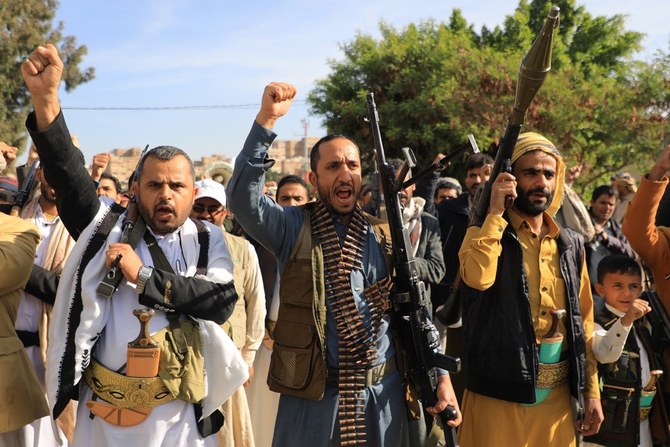
- Abdul Malik Al-Houthi said the militia will start hitting ships heading toward the Cape of Good Hope in Africa’s southern tip
US says Houthis fired ballistic missile over Gulf of Aden

- “This continued malign and reckless behavior by the Iranian-backed Houthis threatens regional stability and endangers the lives of mariners,” CENTCOM said
- The Houthis did not claim credit for any fresh assaults on Monday, but they regularly do days later
AL-MUKALLA: Yemen’s Houthi militia launched a ballistic missile over the Gulf of Aden on Sunday, the US military said.
This comes as the Houthis intensified attacks on Yemeni government soldiers around the country.
The US military said in a statement on Monday morning Yemen time that at about 9:35 p.m. (Sanaa time) on Sunday, the Houthis launched one anti-ship ballistic missile from Yemen over the Gulf of Aden, but neither the US-led coalition nor international commercial ships reported being hit by the missile.
“This continued malign and reckless behavior by the Iranian-backed Houthis threatens regional stability and endangers the lives of mariners across the Red Sea and Gulf of Aden,” CENTCOM said.
The Houthis did not claim credit for any fresh assaults on Monday, but they regularly do days later.
The Houthis’ newest missile launch is part of an escalation of missile and drone strikes against commercial and navy ships in international seas near Yemen as well as in the Indian Ocean, which the Houthis claim are in support of Palestine.
The Houthis attacked dozens of ships with hundreds of ballistic missiles, drones and drone boats during their campaign against ships, which started in November.
They also took control of one commercial ship and destroyed another.
The US military said on Saturday that a Greek-owned and operated oil tanker heading toward China in the Red Sea, flying the flag of Panama, barely avoided being struck by a ballistic missile launched by the Houthis.
Meanwhile, four Yemeni government troops were killed on Monday while battling the Houthis in the province of Taiz, bringing the total number of soldiers killed in Houthi attacks to 11 in less than a week.
Local media said that the government’s Nation’s Shield Forces engaged in heavy fighting with the Houthis in the Hayfan area, on the border between Taiz and Lahj provinces, that left four of its soldiers dead.
On Saturday, a soldier from the same Yemeni military unit was killed and another injured while defending their position in Haydan against a Houthi onslaught.
Six more Yemeni soldiers from the government’s Giants Brigades were killed on Saturday in fighting with the Houthis in the Al-Abadia region of Marib’s central province.
On Monday, the Houthis held a military burial procession in Sanaa for two of their troops killed while battling with Yemeni government forces.
The Houthis have organized similar funerals for hundreds of fighters who have died on the front lines ever since the UN-brokered ceasefire came into effect in April 2022.
At the same time, official media said that Yemen’s Defense Minister Lt. Gen. Mohsen Al-Daeri met the UN Yemen envoy’s military adviser, General Antony Hayward, in Aden on Sunday to discuss Houthi attacks on government troops across the country, peace efforts to end the war, and the smuggling of Iranian weapons to the Houthis.
Al-Daeri said that the Houthis had breached agreements with the Yemeni government and would continue to pose a danger to international maritime lines as long as they controlled Yemeni territory on the Red Sea.
He also accused Iran of continuing to supply weapons and military officers to the Houthis through direct journeys from Iran’s Bandar Abbas port to the Houthi-controlled Hodeidah port.
On Monday, UN experts, including Nazila Ghanea, special rapporteur on freedom of religion or belief, urged the Houthis to release five members of the Bahai religious minority and to stop persecuting religious minorities in regions they control.
“We urge the de facto authorities to release these five individuals immediately and refrain from any further action that may jeopardize their physical and psychological integrity,” the experts said.
Armed Houthis abducted 17 Bahais, including five women, after bursting into a meeting in Sanaa a year ago, and they have refused to release them despite local and international requests.
According to the UN experts, the Houthis released 12 Bahais under “very strict conditions” after signing a written pledge not to communicate with other sect members, avoid religious activities and not leave cities without permission, and that the Houthis continue to hold five who are at risk of mistreatment by their captors.
“We are concerned that they continue to be at serious risk of torture and other human rights violations, including acts tantamount to enforced disappearance,” the UN experts said.
Egypt mourns death of Iran’s president

- The Egyptian president expressed Egypt’s solidarity with the leadership and people of Iran during this tragic time
CAIRO: Egypt mourned the deaths of Iran’s President Ebrahim Raisi and Foreign Minister Hossein Amir-Abdollahian.
Egypt’s presidency said in a statement: “It is with deep grief and sorrow that the Arab Republic of Egypt mourns the death of the President of the Islamic Republic of Iran, Ebrahim Raisi, Iran’s Minister of Foreign Affairs Hossein Amir-Abdollahian and their escorts on Sunday in a tragic crash.
“President Abdel Fattah El-Sisi extends his sincere condolences to the people of Iran, asking Allah to envelop President Raisi and the deceased with his mercy and grant solace and comfort to their families.”
The Egyptian president expressed Egypt’s solidarity with the leadership and people of Iran during this tragic time.
Meanwhile, Egypt’s Minister of Foreign Affairs Sameh Shoukry extended his condolences to the Iranian government and people over the deaths of Raisi and Amir-Abdollahian, according to ministry spokesperson Ahmed Abu Zeid.
A helicopter carrying Raisi, Amir-Abdollahian, and several other officials crashed in mountainous terrain in the country’s northwest on Sunday. On Monday, Tehran announced the deaths of Raisi, Amir-Abdollahian, and their accompanying delegation in the crash.
Israel calls ICC prosecutor’s bid for PM arrest warrant a ‘historical disgrace’

- Katz denounced the move as a “scandalous decision” that amounted to “a frontal attack... on the victims of October 7“
- The minister added that Israel would establish a special committee to fight the ICC prosecutor’s efforts to secure a warrant
JERUSALEM: Israel on Monday slammed as a “historical disgrace” an application by the prosecutor of the International Criminal Court for an arrest warrant for Prime Minister Benjamin Netanyahu.
The prosecutor, Karim Khan, applied for arrest warrants against Netanyahu and Defense Minister Yoav Gallant as well as top Hamas leaders on suspicion of war crimes and crimes against humanity.
Foreign Minister Israel Katz said that Khan “in the same breath mentions the Prime Minister and the Minister of Defense of the State of Israel alongside the abominable Nazi monsters of Hamas — a historical disgrace that will be remembered forever.”
The prosecutor said he was seeking warrants against Netanyahu and Gallant for crimes including “wilful killing,” “extermination and/or murder” and “starvation.”
Katz denounced the move as a “scandalous decision” that amounted to “a frontal attack... on the victims of October 7” when Hamas launched their attack on Israel, sparking the Gaza war.
The minister added that Israel would establish a special committee to fight the ICC prosecutor’s efforts to secure a warrant, and also embark on a diplomatic push against it.
Katz said he planned to “speak with foreign ministers in leading countries of the world so that they oppose the prosecutor’s decision and announce that, even if orders are issued, they do not intend to enforce them on the leaders of the State of Israel.”
35,562 Palestinians killed in Gaza offensive since Oct. 7 — health ministry

- 106 Palestinians were killed and 176 injured in the past 24 hours
DUBAI: More than 35,562 Palestinians have been killed and 79,652 injured in the Israeli military offensive on Gaza since Oct. 7, the Gaza health ministry said in a statement on Monday.
One hundred and six Palestinians were killed and 176 injured in the past 24 hours, the ministry added.
Source close to Hezbollah says 4 dead in Israeli strikes on Lebanon

- The source close to Hezbollah told AFP that “at least four Hezbollah fighters were killed in Israeli raids on two different sites in southern Lebanon“
- The Israeli military said fighter jets struck “a Hezbollah terrorist cell”
BEIRUT: A source close to Hezbollah said four fighters were killed Monday in south Lebanon, with the Iran-backed group announcing two dead and a retaliatory attack, while Israel claimed strikes.
Hezbollah, a Hamas ally, has traded near daily cross-border fire with Israeli forces since the Palestinian group’s October 7 attack on southern Israel that sparked the war in Gaza.
The source close to Hezbollah told AFP that “at least four Hezbollah fighters were killed in Israeli raids on two different sites in southern Lebanon,” identifying the locations as Naqura on the coast and Mais Al-Jabal, a border village to the east.
The Shiite Muslim movement said two of its fighters, both from Naqura, had been killed, without providing further details.
The Israeli military said fighter jets struck “a Hezbollah terrorist cell” and a launch post in the Mais Al-Jabal area, while Israeli army “artillery fired to remove a threat” in the Naqura area.
Hezbollah said it launched a heavy rocket attack at an Israeli army barracks in the country’s north “in retaliation” for the Naqura strike, while also announcing other attacks on Israeli positions.
Lebanon’s official National News Agency (NNA) reported Israeli strikes on Mais Al-Jabal and Naqura, where it said Israel fired near Hezbollah-affiliated rescue personnel and wounded a civilian.
The fighting has killed at least 423 people in Lebanon, mostly militants but also including 82 civilians, according to an AFP tally.
Israel says 14 soldiers and 11 civilians have been killed on its side of the border.
The violence has raised fears of all-out conflict between Hezbollah and Israel, which went to war in 2006.



